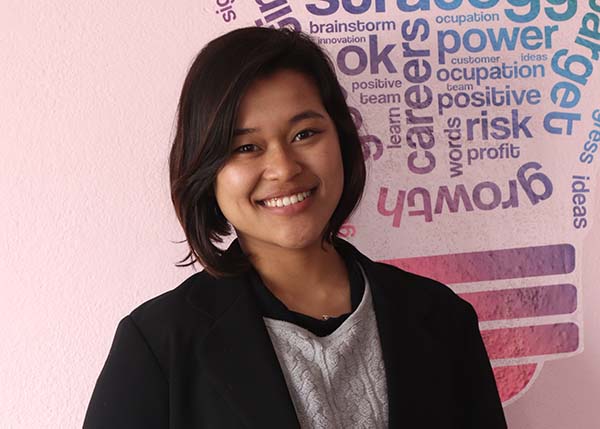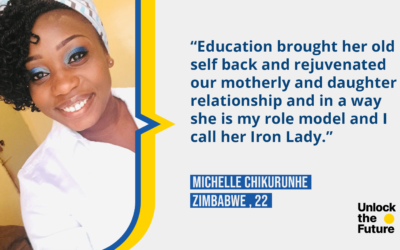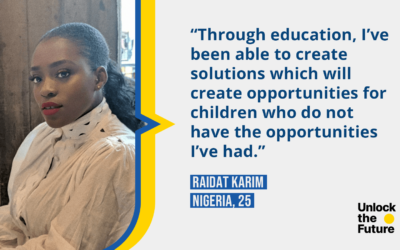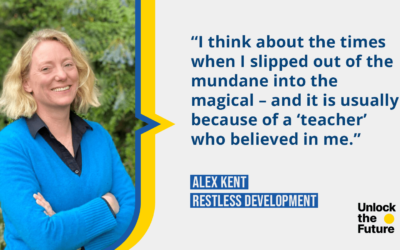“It’s not easy to choose the path of contributing change, while you also have to fight for your own space and voice.”

Sushmina Baidya, 27, from Nepal, is the Co-Founder of a youth network based in Kathmandu called YOUTHive Nepal. She is also the former Fellow-in-Residence for Asia/Oceania at Peace First, a global nonprofit organization dedicated to work with young people between 13-25 years old.
As an advocate for youth leadership, school-to-work transition and quality education, she has been actively working with children and young people in her community. Additionally, Sushmina is a member of the Transforming Education Summit Action Group, supported by the United Nations Foundation under the Unlock the Future Coalition.
Currently, she is pursuing her Masters in Children, Youth, and International Development at Birbeck, University of London as a Chevening Scholar (2021-22).
What inspired you to advocate for education?
There are two main reasons that inspired me to advocate for education. I grew up in a school that prioritized students who were academically excelling. Students who were able to receive distinction were regarded as role models.
This caused two consequences: first, students felt the pressure and were compelled to opt out of extracurricular activities. Second, it created an invisible demarcation between academically “excelling” and “non-excelling” students. This further led to developing imposter syndromes and lack of self-esteem among students. The growing emphasis on the academic scores received by the students led to disengaged pedagogical practices within and beyond the classroom.
The second reason was the disengaged learning to work transition. After I continued my higher education, I realized the degrading learning methodology within the education system. The methodology that rarely focuses more on enhancing critical thinking and developing competency not only affects the time invested in formal education, but leads to difficult school-to-work transition.
What is one personal story that reflects the impact education has had on your life, or the life of someone you know?
I was born and raised in Kathmandu in a family of five. My parents gave birth to three daughters in a community where patriarchy saliently paces its way. In a way, I always felt our family was a silent rebel. I am not saying this just because we were a dominantly female family. Gender inequality was never about fighting between sexes or which gender outnumbered the rest. It is the fight against patriarchal values.
The silent screams of people whose existence were questioned—and life choices denied for who they are and who they wanted to become. My elder sister and her husband chose to stay at our home after marriage, withstanding extreme social criticism. My other elder sister opted to adopt a child with her husband in a society where birth of your own offspring is regarded as the symbol of successful marriage. This is why I always believed my family was a silent rebel.
Somehow, the rebellion characteristics grew in me when I was 15 years old and studying in grade 10. My school introduced a system of reshuffling students into sections, as per the internal grades, in the last leg of the academic year, in order to “produce” academically excelling students. Not adhering to the new system, which we felt was discriminatory, a silent protest was organized. Neither did we allow students to relocate nor the teachers to continue the classes. After three days, the administration called a meeting and decided to lift the system.
When the administration called us for a meeting, I remember finding myself in the biggest auditorium that my school had. On the podium stood our former Program Coordinator who seemed vividly upset. For the first time, the entire school resisted. The protest was a mere symbol of resistance. What it represented was the resistance towards the existing hegemonic relation between students and teachers – the pedagogical practice of authoritative teaching. At that moment, I realized that there is a need to dismantle the entire education system, not just in Nepal but globally.
“At that moment, I realized that there is a need to dismantle the entire education system, not just in Nepal but globally.”
What is the biggest challenge facing young learners now, and what can we do to address the crisis?
Illich (2007) in his book Deschooling Society discusses how education, as a right, is subsumed as a value of personhood. One of the reasons is the uniformity of the education system – which I prefer to term as colonial education.
Colonial education disregards the community based value systems to integrate in the education system. For instance, vernacular education is not considered as formal unless it is offered by a formal institution.
Learning by doing is not accredited as formal education unless backed up by an institution with students wearing uniforms. This suggests the risk of uniformity in curriculum that fails to engage the community in the learning process. Therefore, value-based learning in curriculum needs to be integrated if we are to revise the curriculum.
All 17 Goals will be reviewed during the SDG Summit in 2023, the largest global moment since the launch of the 2030 Agenda eight years ago. What is your advice to education leaders and young people preparing for post-TES mobilization?
I will begin by sharing a beautiful piece written by bell hooks on Teaching to Transgress:
“The academy is not a paradise. But learning is a place where paradise can be created. The classroom, with all its limitations, remains a location of possibility. In that field of possibility we have the opportunity to labor for freedom, to demand of ourselves and our comrades, an openness of mind and heart that allows us to face the reality even as we collectively imagine ways beyond boundaries, to transgress. This is education as the practice of freedom.”
I urge the education leaders and young leaders to continue advocating to imagine an education system that does not limit the potential of students. There is a dire need to look beyond curating uniform curriculum, but rather investigate the context of the community, and how it could integrate into the life of a person. This means to raise questions on how we can create a community centric curriculum that caters to the needs of the students and the community they live in.
Who is your superhero that you admire and why?
My superhero is all the young people who are continuing to thrive through the hardship of advocating change. It is not easy to choose the path of contributing change, while you also have to fight for your own space and voice. Young people around the world are dismantling the notion that you need power and position to change the world. Therefore, my superheroes are those young people who decided to say “yes”. “Yes” to change, “yes” to love, and “yes” to liberation.


